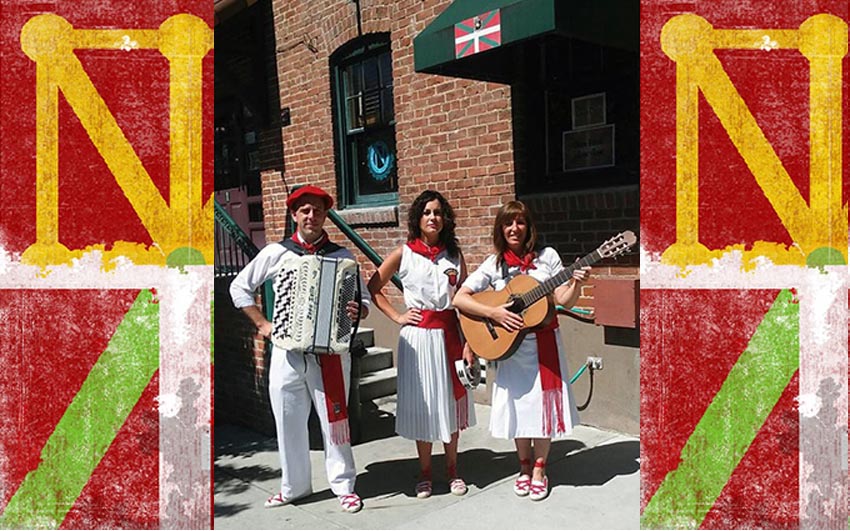Ander Egiluz Beramendi, US. Accompanying Iñaki were Joanna Garrido on the guitarist and Cristina Sadaba on vocals. The first member of the Zabaldi choir and the second is from the jota group La Ribera Canta, both from Navarre. “This is my fourth time in America, said Reta and I decided to come accompanied because the music would be better that way.”
How is your US tour going?
-Really well. Personally I am happy to be back with good friends, as well as feeling very special and a part of the Basque American community.
You warmed up in Chino before going to Boise. How did you move through Idaho’s capital?
-In Chino we performed at the Centro Basco and at the Pizzaioli Restaurant and in Boise at the Leku Ona, and at the Basque Center and every day through the streets to create a more festive atmosphere.
You created the group for Jaialdi, right?
-That’s right, we got together especially for this trip. This is my fourth time in America and I wanted to come accompanied so the music would be better.
Do you have any family in America?
-None of us do. My family went to France during the Franco years and that is why I understand how hard it was for those who came here. The best part is how they have maintained and preserved our roots. I came to the US for the first time in 2008, thanks to my friendship with Mike Bidart; and was so impressed with the Basque community, that I come back every chance I get.
-What caught your attention most from the Diaspora?
-They have left a legacy that you have to get to know. In Euskadi, normally, people aren’t linked to the Diaspora and they can’t imagine what is here. I think it is necessary that they find out, it would go a long way in getting rid of many political clichés that don’t do anything but stain our culture’s image. I also see it as education that should be included in the classroom so that youth understand the effort that our grandparents put forth in the world, maintaining the essence of Euskal Herria.
What makes the jota so attractive?
-My grandfather sang Jotas and my father also sings. I grew up listening to them my entire life, and so I’ve always liked them. It is part of the folklore of Navarre and is deeply rooted in our tradition and customs, maybe more in the Ribera, where my family is from. That is why I think it is necessary to maintain our regional song, and pass it along to future generations, as my family has done.
It’s important to maintain traditions, but also to give them a spin. You sing jotas in English, so does that mean that the Jota isn’t linked to a specific language?
-The Jota has been linked to Spanish, mainly, and now there are some that are sung in Basque and are part of Basque kalejiras and zortzikos. Jotas in English have been more recently introduced. Personally, I think it is a positive thing, because I think it opens up borders. There are always purists that critique this kind of innovation and mixes, but, as in other musical styles, it is the evolution of the same. I always respect the tradition and the essence of the Jota will not fall into oblivion, it is good to get out of our country and provide a part of our culture.
In the US Diaspora there is quite a bit of trikitixa, and in the West there is a lot of Klika, there is also dancing…. And every year there is Udaleku for the kids organized by NABO, that welcomes may teachers from the Basque Country to teach pilota, pala, mus, euskera, txistu….Would you like to come some year to teach Jotas?
-I would love to. Working in something like that would give me both personal and professional satisfaction.






 Send to a friend
Send to a friend Add comment
Add comment








